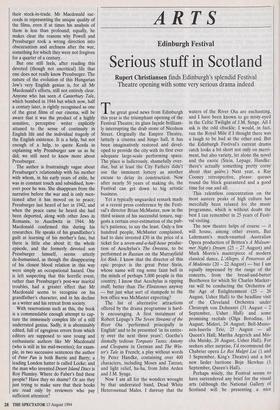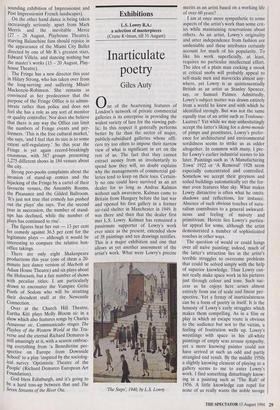ARTS
Edinburgh Festival
Serious stuff in Scotland
Rupert Christiansen finds Edinburgh's splendid Festival Theatre opening with some very serious drama indeed The great good news from Edinburgh this year is the triumphant opening of the Festival Theatre, its glass fagade brilliant- ly interrupting the drab stone of Nicolson Street. Originally the Empire Theatre, latterly a cinema and bingo hall, it has been imaginatively restored and devel- oped to provide the city with its first ever adequate large-scale performing space. The place is ludicrously, shamefully over- due, but at least the City Fathers didn't use the imminent lottery as another excuse to delay its construction. Now after nearly 50 years of making do, the Festival can get down to big artistic business.
Yet a typically unguarded remark made at a recent press conference by the Festi- val's director Brian McMaster, now in the third season of his successful tenure, sug- gests a certain over-estimation of the pub- lic's patience, to say the least. Onlya few hundred people, McMaster complained, had to date invested £30 in the price of a ticket for a seven-and-a-half-hour produc- tion of Aeschylus's The Oresteia, to be performed in Russian on the Murrayfield Ice Rink. I know that the director of this epic project is the great Peter Stein, whose name will ring some faint bell in the minds of perhaps 5,000 people in this country; I know that Aeschylus is ripping stuff, better than The Flintstones anyway — but just what sort of stampede to the box office was McMaster expecting?
The list of alternative attractions offered by the drama programme is hard- ly encouraging. A first instalment of Robert Lepage's The Seven Streams of the River Ota 'performed principally in English' and to be presented 'in its entire- ty over the next three years'; Goethe's dismally tedious Torquato Tasso; Antony and Cleopatra in German and The Win- ter's Tale in French; a play without words by Peter Handke, containing over 400 characters, including Moses and Tarzan; and light relief, ha-ha, from John Arden and J.M. Synge.
Now I am all for the wonders wrought by that underrated band, Dead White Heterosexual Males. I daresay that the waters of the River Ota are enchanting, and I have been known to go misty-eyed in the Celtic Twilight of J.M. Synge. All I ask is the odd chuckle: I would, in fact, run the Royal Mile if I thought there was a laugh to be had at the other end. But the Edinburgh Festival's current drama catch looks a bit short not only on merri- ment, but also variety, let alone the novel and the exotic (Stein, Lepage, Handke: there's actually something pretty corny about that galere.) Next year, a Ray Cooney retrospective, please: queues round the block guaranteed and a good time for one and all.
This relentless concentration on the most austere peaks of high culture has mercifully been relaxed for the music programme, which is without doubt the best I can remember in 25 years of Festi- val visiting.
The new theatre helps of course — it will house, among other events, Baz Luhrmann's much-vaunted Australian Opera production of Britten's A Midsum- mer Night's Dream (25 – 27 August) and Mark Morris's masterpiece of modern classical dance, L'Allegro, it Penseroso ed it Moderato (20 – 22 August) — but I am equally impressed by the range of the concerts, from the bread-and-butter Beethoven for which Sir Charles Macker- ras will be conducting the Orchestra of the Age of Enlightenment (25 – 26 August, Usher Hall) to the headline visit of the Cleveland Orchestra under Christoph von Dohnanyi (31 August – 2 September, Usher Hall) and some promising recitals (Olga Borodina, 16 August; Midori, 24 August; Bell-Musto- nen-Isserlis Trio, 25 August — all Queen's Hall; Martha Argerich and Mis- cha Maisky, 28 August, Usher Hall). For seekers after surprise, I'd recommend the Chabrier opera Le Roi Malgre Lui (1 and 3 September, King's Theatre) and a hot new lieder baritone Boje Skovhus (1 September, Queen's Hall).
Perhaps wisely, the Festival seems to have surrendered any brief for the visual arts (although the National Gallery of Scotland will be presenting a nice sounding exhibition of Impressionist and Post Impressionist French landscapes).
On the other hand dance is being taken increasingly seriously: apart from Mark Morris and the inevitable Merce (27 – 28 August, Playhouse Theatre), starving Balanchine fans should rejoice in the appearance of the Miami City Ballet directed by one of Mr B.'s greatest stars, Edward Villela, and dancing nothing but the master's works (15 – 20 August, Play- house Theatre).
The Fringe has a new director this year in Hilary Strong, who has taken over from the long-serving and suffering Mhairi Mackenzie-Robinson. She remains as convinced as her predecessor that the Purpose of the Fringe Office is to admin- istrate rather than police and does not feel she has a role as any sort of monitor or quality controller. Nor does she believe that there is any way the Office can limit the numbers of Fringe events and per- formers. `This is the free cultural market,' she says, `and I feel that its size is to some extent self-regulatory.' So this year the Fringe is yet again record-breakingly enormous, with 587 groups presenting 1,275 different shows in 184 venues about the city.
Strong poo-poohs complaints about the invasion of stand-up comics and the hijacking of the Fringe by a cartel of their favourite venues, the Assembly Rooms, the Pleasance and the Gilded Ballroom. It's just not true that comedy has pushed out the plays' she says. `For the second year in succession, the number of stand- ups has declined, while the number of plays has continued to rise'.
The figures bear her out — 13 per cent for comedy against 36.5 per cent for the legitimate plays — although it would be interesting to compare the relative box- office takings.
There are only eight Shakespeare productions this year (one of them a 20- minute jazz dance version of Macbeth at Adam House Theatre) and six plays about the Holocaust, but a fair number of shows with peculiar titles: I am particularly drawn to encounter the Vampire Girlie Poofs of Sodom who will be strutting their decadent stuff at the Newcastle Connection.
Over at the Church Hill Theatre, Eartha Kitt plays Molly Bloom sic in a show which also features songs by Charles Aznavour sic. Communicado stages The Playboy of the Western World at the Tra- verse and the eternal Richard Demarco is still amazingly at it, with a season embrac- ing everything from `a Benedictine per- spective on Europe from Downside School' to a play `inspired by the sociolog- ical survey `Optimistic Theatre of the People' (Richard Demarco European Art Foundation).
God bless Edinburgh, and it's going to be a hard toss-up between that and The Seven Streams of the River Ota.











































 Previous page
Previous page